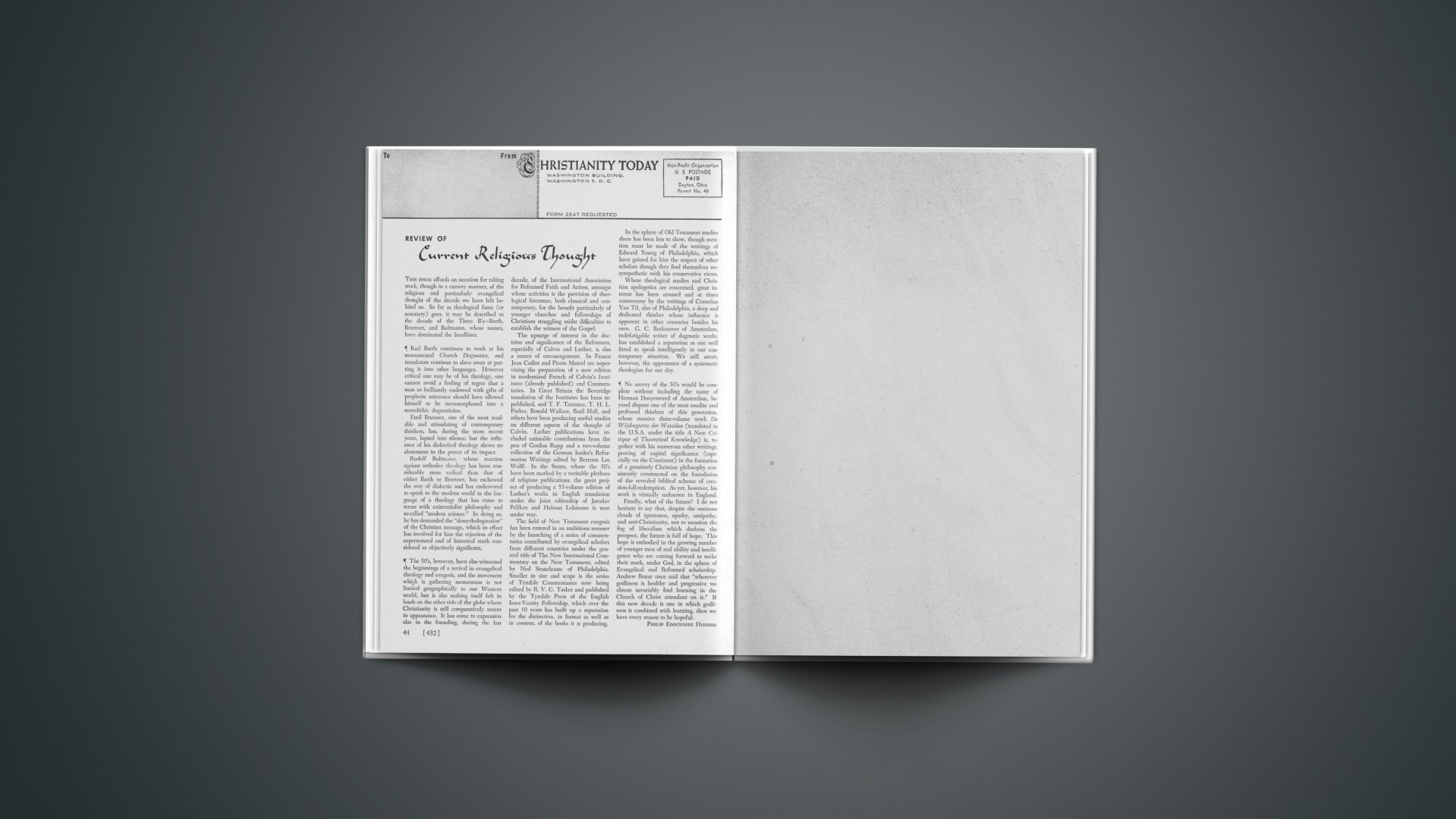This issue affords an occasion for taking stock, though in a cursory manner, of the religious and particularly evangelical thought of the decade we have left behind us. So far as theological fame (or notoriety) goes, it may be described as the decade of the Three B’s—Barth, Brunner, and Bultmann, whose names, have dominated the headlines.
Karl Barth continues to work at his monumental Church Dogmatics, and translators continue to slave away at putting it into other languages. However critical one may be of his theology, one cannot avoid a feeling of regret that a man so brilliantly endowed with gifts of prophetic utterance should have allowed himself to be metamorphosed into a monolithic dogmatician.
Emil Brunner, one of the most readable and stimulating of contemporary thinkers, has, during the more recent years, lapsed into silence; but the influence of his dialectical theology shows no abatement in the power of its impact.
Rudolf Bultmann, whose reaction against orthodox theology has been considerably more radical than that of either Barth or Brunner, has eschewed the way of dialectic and has endeavored to speak to the modern world in the language of a theology that has come to terms with existentialist philosophy and so-called “modern science.” In doing so, he has demanded the “demythologization” of the Christian message, which in effect has involved for him the rejection of the supernatural and of historical truth considered as objectively significant.
The 50’s, however, have also witnessed the beginnings of a revival in evangelical theology and exegesis, and the movement which is gathering momentum is not limited geographically to our Western world, but is also making itself felt in lands on the other side of the globe where Christianity is still comparatively recent in appearance. It has come to expression also in the founding, during the last decade, of the International Association for Reformed Faith and Action, amongst whose activities is the provision of theological literature, both classical and contemporary, for the benefit particularly of younger churches and fellowships of Christians struggling midst difficulties to establish the witness of the Gospel.
The upsurge of interest in the doctrine and significance of the Reformers, especially of Calvin and Luther, is also a source of encouragement. In France Jean Cadier and Pierre Marcel are supervising the preparation of a new edition in modernized French of Calvin’s Institutes (already published) and Commentaries. In Great Britain the Beveridge translation of the Institutes has been republished, and T. F. Torrance, T. H. L. Parker, Ronald Wallace, Basil Hall, and others have been producing useful studies on different aspects of the thought of Calvin. Luther publications have included estimable contributions from the pen of Gordon Rupp and a two-volume collection of the German leader’s Reformation Writings edited by Bertram Lee Wolff. In the States, where the 50’s have been marked by a veritable plethora of religious publications, the great project of producing a 55-volume edition of Luther’s works in English translation under the joint editorship of Jaroslav Pelikan and Helmut Lehmann is now under way.
The field of New Testament exegesis has been entered in an ambitious manner by the launching of a series of commentaries contributed by evangelical scholars from different countries under the general title of The New International Commentary on the New Testament, edited by Ned Stonehouse of Philadelphia. Smaller in size and scope is the series of Tyndale Commentaries now being edited by R. V. G. Tasker and published by the Tyndale Press of the English Inter-Varsity Fellowship, which over the past 10 years has built up a reputation for the distinction, in format as well as in content, of the books it is producing.
In the sphere of Old Testament studies there has been less to show, though mention must be made of the writings of Edward Young of Philadelphia, which have gained for him the respect of other scholars though they find themselves unsympathetic with his conservative views.
Where theological studies and Christian apologetics are concerned, great interest has been aroused and at times controversy by the writings of Cornelius Van Til, also of Philadelphia, a deep and dedicated thinker whose influence is apparent in other countries besides his own. G. C. Berkouwer of Amsterdam, indefatigable writer of dogmatic works, has established a reputation as one well fitted to speak intelligently to our contemporary situation. We still await, however, the appearance of a systematic theologian for our day.
No survey of the 50’s would be complete without including the name of Herman Dooyeweerd of Amsterdam, beyond dispute one of the most erudite and profound thinkers of this generation, whose massive three-volume work De Wijsbegeerte der Wetsidee (translated in the U.S.A. under the title A New Critique of Theoretical Knowledge) is, together with his numerous other writings, proving of capital significance (especially on the Continent) in the formation of a genuinely Christian philosophy consistently constructed on the foundation of the revealed biblical scheme of creation-fall-redemption. As yet, however, his work is virtually unknown in England.
Finally, what of the future? I do not hesitate to say that, despite the ominous clouds of ignorance, apathy, antipathy, and anti-Christianity, not to mention the fog of liberalism which darkens the prospect, the future is full of hope. This hope is embodied in the growing number of younger men of real ability and intelligence who are coming forward to make their mark, under God, in the sphere of Evangelical and Reformed scholarship. Andrew Bonar once said that “wherever godliness is healthy and progressive we almost invariably find learning in the Church of Christ attendant on it.” If this new decade is one in which godliness is combined with learning, then we have every reason to be hopeful.










